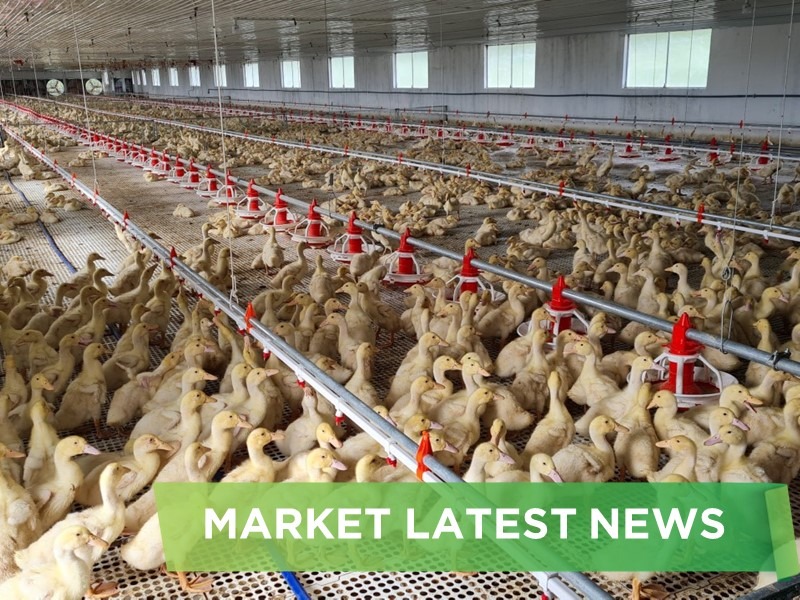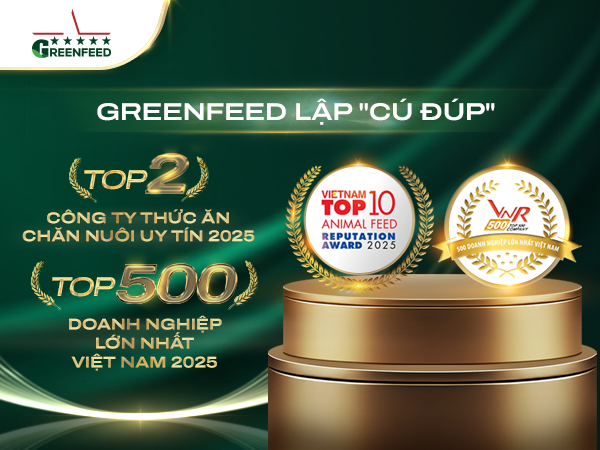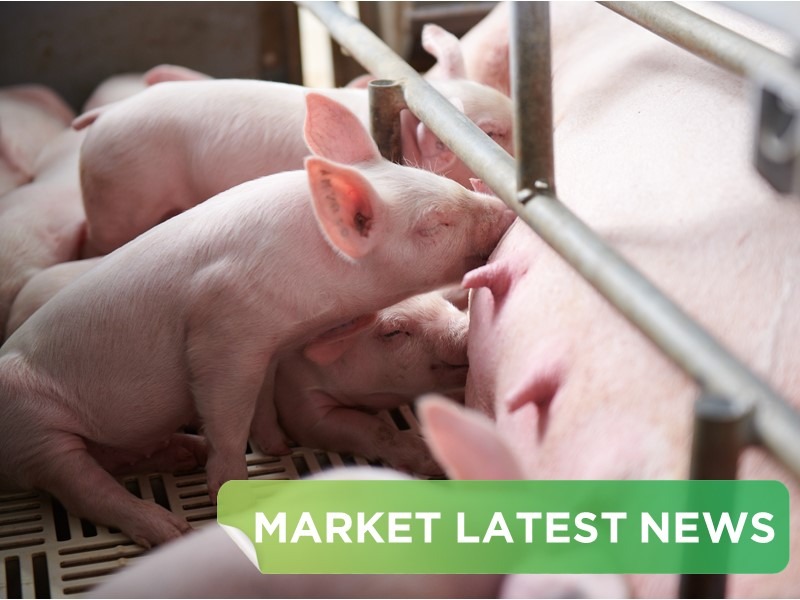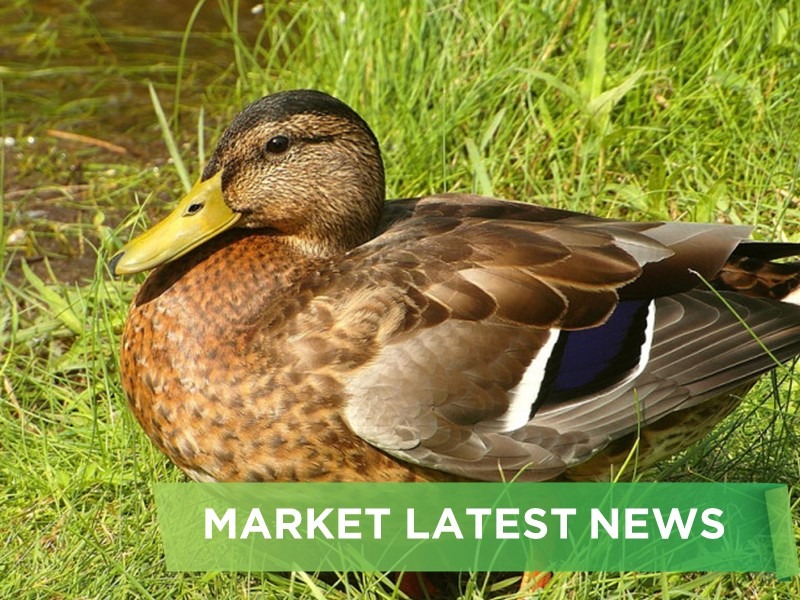The Ministry of Agriculture and Environment proposes to regulate that products that have only undergone conventional processing are used as animal feed; livestock breeds; livestock products are not subject to tax.
The Ministry of Agriculture and Environment proposes to adjust VAT on animal feed, breeds and livestock products.
On August 12, the Ministry of Agriculture and Environment sent an official dispatch to the Prime Minister regarding VAT on animal feed ingredients, animal breeds and livestock products.
According to the Ministry of Agriculture and Environment, in sharing the difficulties with the domestic livestock industry, the Government and the Prime Minister have had many support policies; especially the tax policy on animal feed and livestock breeds... thereby helping the livestock industry maintain its growth rate, meet the food demand for domestic consumption and increase exports.
Regulations on livestock breed products are not unified.
According to the Ministry of Agriculture and Environment, in addition to policies to support the livestock industry, there are still inconsistent regulations that are causing difficulties for the production and business activities of livestock breeders and enterprises. Specifically, in Clause 1, Clause 2, Clause 3, Article 5 of the Law on Value Added Tax.
Clause 1, Clause 2 and Clause 3, Article 5 of the Law on Value Added Tax stipulate that the following subjects are not subject to tax: “1. Products of crops, planted forests, livestock, aquaculture, and fishing that have not been processed into other products or have only undergone normal preliminary processing by organizations and individuals that produce, catch, and sell them and at the import stage; 2. Products of livestock breeds according to the provisions of the law on livestock breeding, plant breeding materials according to the provisions of the law on cultivation; 3. Animal feed according to the provisions of the law on livestock breeding; aquatic feed according to the provisions of the law on aquatic products.”
Point d, Clause 2, Article 9 of the Law on Value Added Tax stipulates that the tax rate of 5% applies to: “Products of crops, planted forests (except for wood, bamboo shoots), livestock, aquaculture, and fishing that have not been processed into other products or have only undergone conventional preliminary processing, except for products specified in Clause 1, Article 5 of this Law”.
Applying tax to traditional animal feed is not appropriate.
Regarding animal feed, Clause 25, Article 2 of the Law on Animal Husbandry stipulates: “Animal feed is a product that livestock eats and drinks in fresh, raw or processed form, including complete mixed feed, concentrated feed, supplementary feed, and traditional feed.”.
Clause 29, Article 2 of the Law on Animal Husbandry stipulates: “Traditional food is agricultural, aquatic and industrial processed products commonly used in animal husbandry according to custom, including paddy, rice, bran, corn, potatoes, cassava, wine lees, beer lees, cassava residue, pineapple residue, molasses, straw, grass, shrimp, crab, fish and other similar products”.
According to the Ministry of Agriculture and Environment, based on the above regulations, traditional food is raw materials of plant origin that are plant products that have not been processed into other products or have only undergone conventional preliminary processing such as paddy, rice, bran, corn, potatoes, cassava, etc., which are not subject to VAT according to the provisions of Article 5 of the Law on Value Added Tax.
The application of a 5% tax rate by some local tax authorities to these items as prescribed in Point d, Clause 2, Article 9 of the Law on Value Added Tax is inappropriate, and creates a significant cost burden for businesses and livestock farmers, especially for small businesses that are unable to directly import or cannot purchase raw materials from farmers but must go through intermediate processing (such as drying corn, milling rice, etc.).
Because animal feed is not subject to VAT as prescribed in Clause 3, Article 5 of the Law on Value Added Tax, input tax is not deductible, forcing businesses to account for it in production costs, increasing the price of animal feed and livestock products, which ultimately has to be borne by domestic consumers.
The Ministry of Agriculture and Environment stated that currently, most enterprises producing and trading animal feed apply VAT to input materials as prescribed in Clause 3, Article 5 of the Law on Value Added Tax; Some enterprises apply according to Clause 5, Article 9 of the Law on Value Added Tax but suspend the tax; some enterprises produce at a moderate level because they do not know how to account for business when the tax regulations are unclear.
Proposal to amend tax regulations that are causing disadvantages to livestock.
Regarding livestock breeds and livestock products, Clause 23, Article 2 of the Law on Livestock stipulates: “Livestock breeds include breeding animals, semen, embryos, breeding eggs, larvae and other genetic materials exploited from livestock”.
Clause 33, Article 2 of the Law on Livestock stipulates: “Livestock products include meat, eggs, milk, honey, beeswax, silkworm cocoons, bird’s nests, bones, horns, hooves, internal organs; unprocessed feathers, skin and other products exploited from livestock”.
Weaned piglets or one-day-old poultry born from parent stock for meat purposes are subjects specified in Clause 33, Article 2 of the Law on Animal Husbandry, which are in the group of “other products exploited from livestock” and are not subject to VAT as prescribed in Clause 1, Article 5 of the Law on Value Added Tax.
The Ministry of Agriculture and Environment believes that the application of a 5% tax rate by some local tax authorities to these items as prescribed in Point d, Clause 2, Article 9 of the Law on Value Added Tax is inappropriate.
Because seed distribution units are not allowed to deduct output tax, paying an additional 5% VAT will increase the cost of output products, increase the price of food to domestic consumers, causing great disadvantages for livestock farms, especially in the context of increasingly fierce market competition as it is today.
The Ministry of Agriculture and Environment proposes that the Prime Minister assign the Ministry of Finance to preside over and coordinate with relevant ministries and branches to advise the Government to propose the National Assembly to amend and supplement the provisions at Point d, Clause 2, Article 9 of the Law on Value Added Tax according to the simplified procedures and order in the direction: Products of crops, planted forests, livestock, aquaculture, and fishing that have not been processed into other products or have only undergone normal preliminary processing and are used as animal feed; livestock breed products; livestock products are not subject to tax, similar to the provisions on animal feed, livestock breed products, and livestock products in Article 5 of the Law on Value Added Tax.
During the time Point d, Clause 2, Article 9 of the Law on Value Added Tax has not been amended and supplemented, the Ministry of Agriculture and Environment proposes that the Prime Minister agree to issue a Government Resolution on the above amendments and supplements./.
(Source: Hong Kieu - VNA/ Vietnam+)











